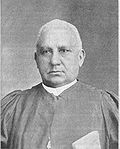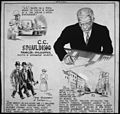Portal:Civil rights movement
The civil rights movement portal The civil rights movement was a social movement in the United States from 1954 to 1968 which aimed to abolish legalized racial segregation, discrimination, and disenfranchisement in the country, which most commonly affected African Americans. The movement had origins in the Reconstruction era in the late 19th century, and modern roots in the 1940s. After years of nonviolent protests and civil disobedience campaigns, the civil rights movement achieved many of its legislative goals in the 1960s, during which it secured new protections in federal law for the civil rights of all Americans. Following the American Civil War (1861–1865), the three Reconstruction Amendments to the U.S. Constitution abolished slavery and granted citizenship to all African Americans, the majority of whom had recently been enslaved in the southern states. During Reconstruction, African-American men in the South voted and held political office, but after 1877 they were increasingly deprived of civil rights under racist Jim Crow laws (which for example banned interracial marriage, introduced literacy tests for voters, and segregated schools) and were subjected to violence from white supremacists during the nadir of American race relations. African Americans who moved to the North in order to improve their prospects in the Great Migration also faced barriers in employment and housing. Legal racial discrimination was upheld by the Supreme Court in its 1896 decision in Plessy v. Ferguson, which established the doctrine of "separate but equal". The movement for civil rights, led by figures such as W. E. B. Du Bois and Booker T. Washington, achieved few gains until after World War II. In 1948, President Harry S. Truman issued an executive order abolishing discrimination in the armed forces. In 1954, the Supreme Court struck down state laws establishing racial segregation in public schools in Brown v. Board of Education. A mass movement for civil rights, led by Martin Luther King Jr. and others, began a campaign of nonviolent protests and civil disobedience including the Montgomery bus boycott in 1955–1956, "sit-ins" in Greensboro and Nashville in 1960, the Birmingham campaign in 1963, and a march from Selma to Montgomery in 1965. Press coverage of events such as the lynching of Emmett Till in 1955 and the use of fire hoses and dogs against protesters in Birmingham increased public support for the civil rights movement. In 1963, about 250,000 people participated in the March on Washington, after which President John F. Kennedy asked Congress to pass civil rights legislation. Kennedy's successor, Lyndon B. Johnson, overcame the opposition of southern politicians to pass three major laws: the Civil Rights Act of 1964, which prohibited discrimination based on race, color, religion, sex, or national origin in public accommodations, employment, and federally assisted programs; the Voting Rights Act of 1965, which outlawed discriminatory voting laws and authorized federal oversight of election law in areas with a history of voter suppression; and the Fair Housing Act of 1968, which banned housing discrimination. The Supreme Court made further pro–civil rights rulings in cases including Browder v. Gayle (1956) and Loving v. Virginia (1967), banning segregation in public transport and striking down laws against interracial marriage. (Full article...) Selected article -The Jim Crow laws were state and local laws introduced in the Southern United States in the late 19th and early 20th centuries that enforced racial segregation, "Jim Crow" being a pejorative term for an African American. The last of the Jim Crow laws were generally overturned in 1965. Formal and informal racial segregation policies were present in other areas of the United States as well, even as several states outside the South had banned discrimination in public accommodations and voting. Southern laws were enacted by white-dominated state legislatures (Redeemers) to disenfranchise and remove political and economic gains made by African Americans during the Reconstruction era. Such continuing racial segregation was also supported by the successful Lily-white movement. In practice, Jim Crow laws mandated racial segregation in all public facilities in the states of the former Confederate States of America and in some others, beginning in the 1870s. Jim Crow laws were upheld in 1896 in the case of Plessy v. Ferguson, in which the Supreme Court laid out its "separate but equal" legal doctrine concerning facilities for African Americans. Public education had essentially been segregated since its establishment in most of the South after the Civil War in 1861–1865. Companion laws excluded almost all African Americans from the vote in the South and deprived them of any representative government. Although in theory the "equal" segregation doctrine governed public facilities and transportation too, facilities for African Americans were consistently inferior and underfunded compared to facilities for white Americans; sometimes, there were no facilities for the black community at all. Far from equality, as a body of law, Jim Crow institutionalized economic, educational, political and social disadvantages and second-class citizenship for most African Americans living in the United States. After the National Association for the Advancement of Colored People (NAACP) was founded in 1909, it became involved in a sustained public protest and campaigns against the Jim Crow laws, and the so-called "separate but equal" doctrine. (Full article...) General imagesThe following are images from various civil rights movement-related articles on Wikipedia.
Related portalsWikiProjectsSelected biography -Septima Poinsette Clark (May 3, 1898 – December 15, 1987) was an African American educator and civil rights activist. Clark developed the literacy and citizenship workshops that played an important role in the drive for voting rights and civil rights for African Americans in the Civil Rights Movement. Septima Clark's work was commonly under-appreciated by Southern male activists. She became known as the "Queen Mother" or "Grandmother" of the Civil Rights Movement in the United States. Martin Luther King Jr. commonly referred to Clark as "The Mother of the Movement". Clark's argument for her position in the Civil Rights Movement was one that claimed "knowledge could empower marginalized groups in ways that formal legal equality couldn't." (Full article...) Selected image - Civil rights activists stage a sit-in at Woolworth's in Durham, NC to protest against racial segregation. (10 February 1960)
Did you know?
TopicsSubcategoriesThings to doAssociated WikimediaThe following Wikimedia Foundation sister projects provide more on this subject:
Discover Wikipedia using portals
|
























































